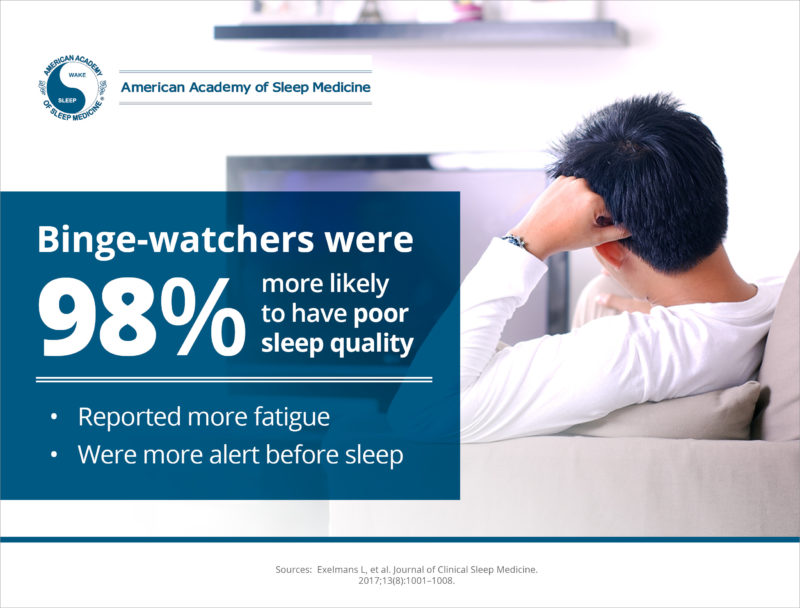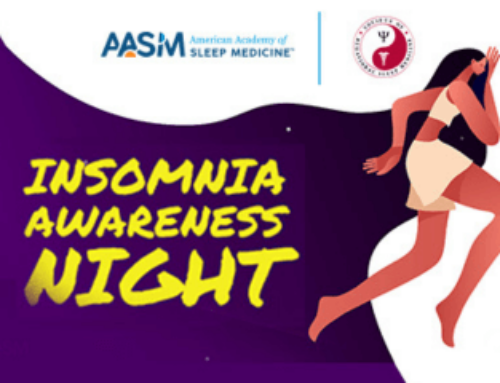DARIEN, IL – A new study is the first to link binge-watching in young adults with poorer sleep quality, more fatigue, and increased insomnia. The findings suggest that the mechanism explaining this relationship is increased cognitive alertness resulting from binge-watching.
Results show that more than 80 percent of young adults identified themselves as a binge-watcher, with 20.2 percent of them binge-watching at least a few times a week in the previous month. Those who identified as a binge-watcher reported more fatigue, more symptoms of insomnia, poorer sleep quality and greater alertness prior to going to sleep. Further analysis found that binge-watchers had a 98 percent higher likelihood of having poor sleep quality compared with those who did not consider themselves to be a binge-watcher.
“We found that the more often young people binge-watch, the higher their cognitive pre-sleep arousal,” said principal investigator and lead author Liese Exelmans, a doctoral candidate in the School for Mass Communication Research at the University of Leuven in Belgium. “That in turn negatively affected sleep quality, fatigue and insomnia.”
Study results are published in the Aug. 15 issue of the Journal of Clinical Sleep Medicine.
The study involved 423 young adults who were 18 to 25 years old, with an average age of 22 years. Sixty-two percent of participants were women, and 74 percent were students. They completed an online survey assessing regular television viewing, binge-watching, sleep quality, fatigue, insomnia, and pre-sleep alertness.
Binge-watching was defined as “watching multiple consecutive episodes of the same television show in one sitting on a screen, be it a television, laptop, computer or tablet.” An average binge-watching session lasted 3 hours and 8 minutes, with 52 percent of binge-watchers viewing three to four episodes in one sitting.
“Bingeable shows often have a complex narrative structure that makes viewers become completely immersed into the story,” said co-author Jan Van den Bulck, PhD, professor in the Department of Communication Studies at the University of Michigan in Ann Arbor. “This intense engagement with television content could require a longer period to ‘cool down’ before going to sleep, thus affecting sleep overall.”
According to Exelmans and Van den Bulck, interventions and treatments to reduce alertness before sleep, such as relaxation techniques and mindfulness, could be valuable approaches to target sleep problems associated with binge-watching. Because binge-watching often occurs unintentionally, it also has been suggested that streaming services such as Netflix should enable viewers to pre-select their maximum viewing duration before beginning each viewing session.
In May the American Academy of Sleep Medicine released tips to help viewers get healthy sleep by binge-watching responsibly. A new public awareness campaign from the AASM, the Centers for Disease Control and Prevention, and other partners in the National Healthy Sleep Awareness Project emphasizes that it is important for children, teens and adults to “Make Time 2 Sleep” (www.projecthealthysleep.org).
For a copy of the study, “Binge Viewing, Sleep, and the Role of Pre-Sleep Arousal,” or to arrange an interview with the study author or an AASM spokesperson, please contact the AASM at media@aasm.org.
The monthly, peer-reviewed Journal of Clinical Sleep Medicine is the official publication of the American Academy of Sleep Medicine, a professional membership society that improves sleep health and promotes high quality, patient-centered care through advocacy, education, strategic research, and practice standards. The AASM encourages patients to talk to their doctor about sleep problems and visit www.sleepeducation.org for more information about sleep, including a searchable directory of AASM-accredited sleep centers.







